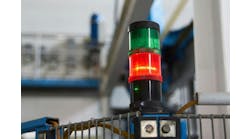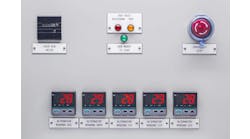When I first covered high-speed, discrete manufacturing and learned about milliseconds, microseconds and nanoseconds, I felt a little queasy that thousands, millions and billions of them were passing with every "one Mississippi."
I learned to accept it, of course, because what alternative is there? However, I still thought I might be missing something if all those little slices within slices were going by unmarked. I know this is more my problem than the clock's, and that it's my perceptions and not time that's fluid and less under control than I'd prefer.
Likewise, I and every other aging adult that feels like time is speeding up reportedly have this sensation because each new event must filter through and be compared to decades of experiences and memories, which make it appear like more milestones are zipping by. Kids have less history to measure against current events, which is why some afternoons, school days and summers last forever.
So, is there any stabilizing remedy or way to make time—or our perception of it—expand or at least appear to be more consistent? Well, time is supposed to slow during high-intensity events. I can confirm this because, when I was knocked off my feet during a long-ago lacrosse game, I remember thinking on the way down that I might as well shoot the ball. No more than couple of tenths of a second passed, but I recall my thought process, and amazingly, I was even able to score.
My response wasn't planned, and I could just as easily have fallen without acting, but I apparently had enough presence of mind in that situation to react in a useful way. I'm also convinced that maintaining a constant, low-level alertness was a big plus while helping to raise my daughters when they were babies and toddlers. Like most fathers, I sometimes used my "dad reflexes" when they fell off chairs, swings or whatever, and caught them just before they got hurt. I don't think this was any special talent, but was merely the benefit of being semi-conscious and ready.
So, can attention and focus expand time in less-urgent situations? Maybe, but there are other ways to accumulate time. Beyond simply striving for greater efficiency, advocates of enough sleep and regular exercise say these healthful activities don't take time, they create time.
Because we're always covering the efficiency front in most of Control's stories, I'm constantly reminded of the tools that users can employ to save time, money and labor. However, I'm equally conscious that many potential users don't seem to know about these tools, how simple many are to implement, or the how much faster they can complete projects that used to take longer.
One of the first of these time-savers is the simple fact that device, configuration or software programming no longer or rarely involves typing in code, even though many potential users still seem to think it does. Most process automation and control programming mostly involves quickly clicking on boxes in menus and/or dragging and dropping software function blocks or the links between them.
Other speedier solutions are today's edge computing modules, which save time by not sending all of an application's data to cloud-computing services.
Similarly, many Internet-enabled devices are skipping the process industry's traditional, proprietary setup, networking, protocol and programming hurdles by doing an end run via their Ethernet ports and Internet protocol (IP) links. Wireless can obviously extend these advantages even further. Finally, several recent software release have preconfigured and self-populating capabilities that can distribute, maintain and update them in equipment and applications with much less manual effort.
Unfortunately, despite the possible time savings and other benefits of recent innovations, many users appear to be unaware of them, or are just stuck in the usual "if it's not broke don't fix it" inertia. In the past, this used to be common-sense, but in light of the mounting gains that can be made, it's starting to look like irresponsibility. Why not take a little time to likely make a lot more?






